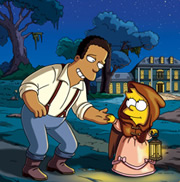Racial myth and miscegenation on “The Simpsons”
Posted March 18th, 2010 by James DeWolf PerryCategory: Popular Culture Tags: Black history month, Historical amnesia, James D'Wolf, Multiracial identity, The Simpsons
James DeWolf Perry is a regular guest contributor. He appears in the film Traces of the Trade and is the Tracing Center’s director of research. This entry originally appeared on James’ own blog, The Living Consequences, on February 21, and the opinions expressed are his own.
 On tonight’s episode of “The Simpsons,” Lisa Simpson explores her family’s historical connection to slavery and presents the results at school for Black History Month.
On tonight’s episode of “The Simpsons,” Lisa Simpson explores her family’s historical connection to slavery and presents the results at school for Black History Month.
This was fascinating for me to watch, as my own family’s powerful connection to slavery has taken up much of my time and energy over the last decade. Being a direct descendant of the leading slave trader in U.S. history, I think I can also relate to Lisa’s worry that her family tree sometimes seems dominated by scoundrels.
Disappointingly, however, this episode perpetuates some of the most common stereotypes that dominate public perceptions about the connections of American families to the nation’s history of slavery. For, immediately after learning that the Simpson family had a connection to slavery, we hear that this story involves Simpson ancestors living in the South, and that they were, in fact, anti-slavery and risked everything they had to take part in the Underground Railroad.
Most readers of this blog know the broad outlines of the true history of American slavery. They know that slave owning was widespread in the northern states, and was actually more common there, on a per-capita basis, than in the South. They know that slavery was not unknown in the Midwest and West, as well, even in states which were nominally free from the outset. They know that most Americans throughout the country were complicit in slavery, either through owning one or more slaves, or through benefiting from economic activities which depended on slavery for their existence. Finally, they know that few Americans, even in the North, were abolitionist, and that involvement in the Underground Railroad was, of course, exceedingly rare. While abolitionist sentiment was admirable and anti-slavery activism daring and praiseworthy, American families were overwhelmingly complacent about slavery, until after several bitter years of civil war.
“The Simpsons” is, of course, only popular entertainment, and the elements of a compelling story won’t necessarily run counter to prevailing public myths about the nation’s history. Nevertheless, this is yet another example of how historical amnesia operates: it is simpler, and more palatable to most of the country, to think of the nation’s slavery as primarily a southern sin, and of families from elsewhere in the country as noble abolitionists. Each time a subject like slavery is discussed only in the contexts which are most palatable to the public, the public will become increasingly convinced that these contexts were representative of history as a whole. The end result is that when I recount the basic facts of the previous paragraph to audiences, the most common response is not that they were unaware of this history, but that they can scarcely believe it could be true.
To be fair to “The Simpsons” and the Fox network, this show did offer one delightful and unexpected twist, which challenges stereotypes and illustrates the sorts of historical patterns which were quite common but are too nuanced to be included in the public memory of slavery and race. In the ending of the episode (“The Color Yellow”), it was revealed that a Simpson ancestor at the heart of the story fell in love with a runaway black slave. As a result, the Simpson family is, in fact, not white at all. The Simpsons turn out to be of mixed race and have been passing as white for generations. In ruminating on this revelation, finally, the Simpson family quickly mentions several stereotypes of black Americans and issues related to white privilege (such as different rates of pay for similar jobs).



Leave a Reply